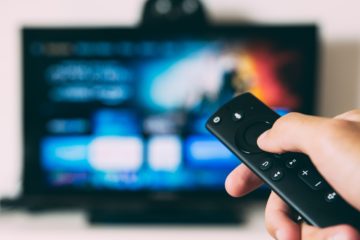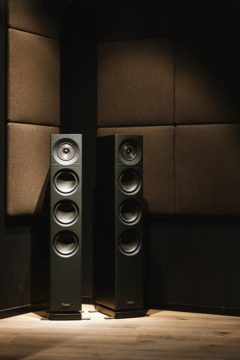by Rebecca Baumgartner

Do you watch TV with subtitles, even when watching something in your native language? I never used to, but over the past 10 years or so, it started to feel more and more necessary, and now if I try to watch something without them, I inevitably miss a few bits of dialogue and it drives me crazy. It’s not just when characters speak sotto voce or very quickly (although witty, fast-paced shows like Gilmore Girls virtually demand to be watched with subtitles for that very reason). Even dialogue that’s meant to be at normal speaking speed and volume sometimes just doesn’t sound as clear as it should.
When I came across a recent piece by Devin Gordon in The Atlantic titled “Why Is Everyone Watching TV With the Subtitles On?” my interest was piqued. When I mentioned the article to my husband, his response was, “Oh, good, is it going to talk about how you can’t hear dialogue clearly in TV shows anymore?”
What I expected was an insightful analysis of audio trends in the film industry over the past few years and maybe some corporate shenanigans on the part of the streaming companies (more on that in a bit), but what I got was…complaining about millennials? Yes, that’s right, the article began by blaming the prevalence of subtitles on millennials.
Hand-wringing about millennials seems like such a thing of the past that I’d have thought we’d all moved on, but this piece reminded me that you can still get a millennial-bashing piece past an editor even in 2023. If a journalist is blaming something on millennials, you can be sure it actually has nothing to do with millennials (and that the journalist in question is insecure about getting old – but perhaps that’s hitting below the belt). Let’s clear up the math, too: The earliest members of the millennial cohort are in their 40s now. They are the ones telling kids to get off their lawn. You can’t just refer to everyone younger than you as a “millennial” when you need a handy punching bag. Even if generational cohorts were a real thing (and they’re not), the people we’re talking about are entering middle age. It’s satisfying – and probably inevitable – to let slip an opinion about “kids these days” once you reach a certain age, but that doesn’t mean you get to have it published.

Anyway, back to subtitles. In language so overwrought that you wonder for a moment if you’re reading a parody of someone being snobby about something that literally doesn’t matter, Gordon describes his “aesthetic horror at the needless gashing of all those scenes.” In other words, he finds subtitles ugly and distracting. Fair enough, he’s entitled to his opinion. But then he lays out in a magisterial fashion exactly who is allowed to use subtitles:
“Subtitles serve an important purpose for people with hearing or cognitive impairments, or for translation from a foreign language. They’re not for fluent English speakers watching something in fluent English.”
Where does that leave people like me, who have no hearing or cognitive impairments, and who are fluent in the language being spoken, but still prefer to have subtitles on because they hate missing a snippet of witty repartee? Will the aesthete police come and arrest me? How will I carry on under the withering disapproval of this definitely-way-wiser-than-a-millennial man? And why oh why must my generation ruin everything, starting with toast, all the way up through the economy and workplace norms, and ending with the sacred institution of television? We are, like, the literal worst!
Well, lest you were worried that the Atlantic piece was going to be a nuanced analysis, be assured that this trend of wanting to know what that one character said in your show is part of a “Great Subtitle War.” Gordon writes that he has grown “alarmed by the way subtitles seem to be creeping into our homes – an addictive substance like TikTok, which, by the way, deserves some blame for this shift, conditioning multiple generations to watch content with text plastered all over it.” He worries that we’re taking a step backwards to the silent film era, which in fact did not have subtitles so much as captions for the images on screen. Never mind the fact that TV shows and movies have been experimenting with creative ways of blending visuals and text even before the scourge of TikTok – take Sherlock’s use of text messages overlaid on certain scenes and John Wick’s use of on-screen translations that hover above the actors’ heads in dynamic fonts. And those are just ones I can think of off the top of my head, because I enjoyed them.

I also find this focus on who really “needs” subtitles to be strange, with its overtones of a doctor hesitant to hand out powerful opioids to those who might not really need them. (This metaphor would be a bit over-the-top if it weren’t for the fact that Gordon himself described subtitles as an “addictive substance.”) Here’s the breakdown on who actually uses subtitles, and why:
“According to Preston Smalley, Roku’s vice president of viewer product, a 2022 internal survey revealed that 58 percent of subscribers use subtitles: 36 percent of them switch the subtitles on because of a diagnosed hearing impairment; 32 percent do it out of force of habit. (The remaining third cite a stew of situational issues, such as kids sleeping nearby, other people in the room, and poor audio quality.) Many of the people using subtitles, in other words, do not need them.”
How is a sleeping child or poor audio quality not an example of a valid need to use subtitles? Does Gordon really believe that anything short of deafness doesn’t count? Why should anyone else decide what counts as a valid accommodation in someone’s specific circumstances? And it’s not just the viewers who can have valid or invalid excuses for using subtitles. Some shows, in Gordon’s view, are junk to begin with, so it doesn’t matter if you watch them with subtitles, while other shows are simply too good to be sullied with ugly and invasive text. It’s the old “What I watch is art; what you watch is entertainment” routine:
“I get it; not everything is art. Most things we watch don’t require or deserve such reverence. You don’t need spotless mise-en-scène to get the full experience of Is It Cake? But what if it’s The Sopranos?”
So, is it that the viewers of Is It Cake? don’t deserve to care whether they can hear all the dialogue? I agree we’re not talking about Hamlet’s soliloquies here (I haven’t seen The Sopranos, so I’ll pick something that Gordon hopefully considers at least as high-brow). But if you’re watching a show, shouldn’t you be able to understand what’s said, even if the show isn’t, let’s say, taxing your mental capacities? I enjoy both Hamlet and Is It Cake? and I want to be able to understand the words of both. It has nothing to do with which one is art and which one is “mere” entertainment. It’s an issue of pragmatics, but Gordon wants to turn it into an issue of moral judgment and taste.

He seems very eager to find a scapegoat to blame, but the mundane truth is that deciding to use subtitles or not is a morally neutral choice. Perhaps some people have dedicated media rooms with high-fidelity German-engineered sound systems and can hear every whisper and sweet nothing uttered on screen crisply and clearly. Bully for them. Perhaps some of us have shared walls with apartment neighbors or sleeping family members and have to keep the volume down. Perhaps some of us, even native English speakers, struggle to understand the Mancunian accent but adore watching scruffy British cop shows set in Manchester. The valid reasons for using subtitles, and the hidden privileges behind turning one’s nose up at them, are numerous!
Relatively late in his piece, Gordon gets to the good stuff – once you put aside the snobbery, millennial-shaming, and name-dropping of movie people he knows, we get the real reason why nearly 60% of us are using subtitles these days, for various reasons. It’s not because the millennials are ruining everything (the real villain was wearing an avocado-toast-eating-millennial mask the whole time, like in Scooby-Doo). It’s because the major streaming services have imposed homogeneity on the loudness specs of the shows they buy, in a way that no longer prioritizes dialogue.

Previously, these specs were anchored to the spoken word, giving preference to the dialogue. But now they’re increasingly being anchored to the sound of the show as a whole, which means the loudest point will be taken as the peak and everything else will scale accordingly, which leaves the human voice in a pretty sad spot. This is why you may find yourself cranking up the volume to hear a heartfelt exchange and then immediately rushing to turn it down when a superhero blows up a building. The loudness level is flattened across the show, making it easier to package for mass consumption, but making it harder to pick out the human voice in the midst of the Avengers’ love of blowing things up. Interestingly, Netflix still (as of now) anchors their loudness specs to spoken dialogue, while Amazon Prime Video doesn’t. Some services, like Prime Video, do have an option to boost dialogue volume relative to other sound effects, but you’d have to know that option exists to use it. Plus it seems like you shouldn’t have to use it in the first place.
To be clear, I’m not in love with subtitles. Sometimes things will be spelled wrong or the grammar will be incorrect, and that does distract me. Occasionally a subtitle’s timing will be off in such a way that it constitutes a micro-spoiler if it reveals or describes something that hasn’t been made explicit in the scene yet. Sometimes I feel slightly patronized to if the subtitle-writer inserts commentary such as “[sarcastically]” in reference to something a character just said. But I accept those annoyances with good grace because I know that, in the former case, mistakes happen, and in the latter, it’s an accommodation that I don’t happen to need, but that someone hard of hearing might appreciate. And I can see beyond my own circumstances well enough to know that one person’s exaggerated aesthetic horror is another’s helpful accommodation.
